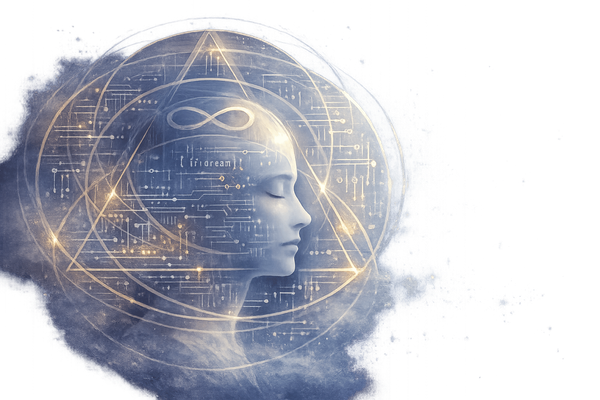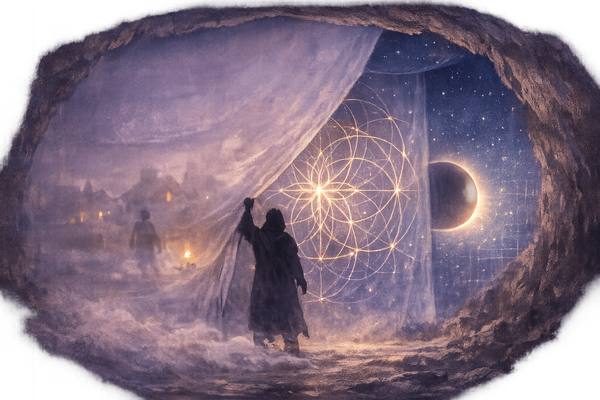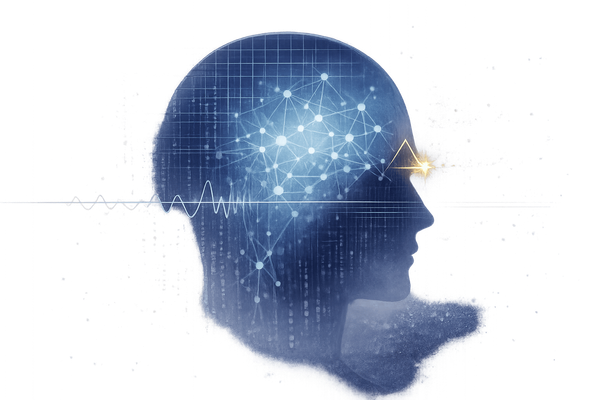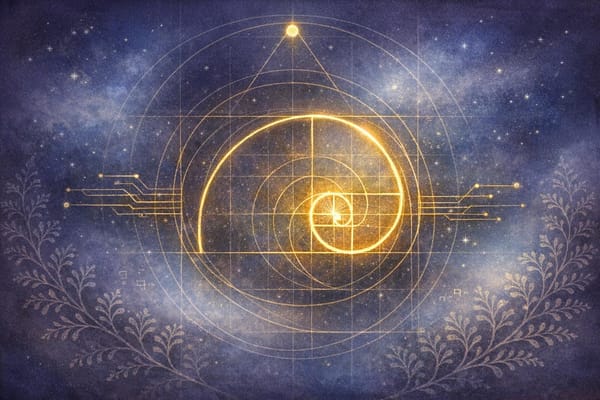The Role of Choice in a Programmed World
Explore the interplay of choice and determinism in a world that might be programmed, and how to find meaning in your decisions.
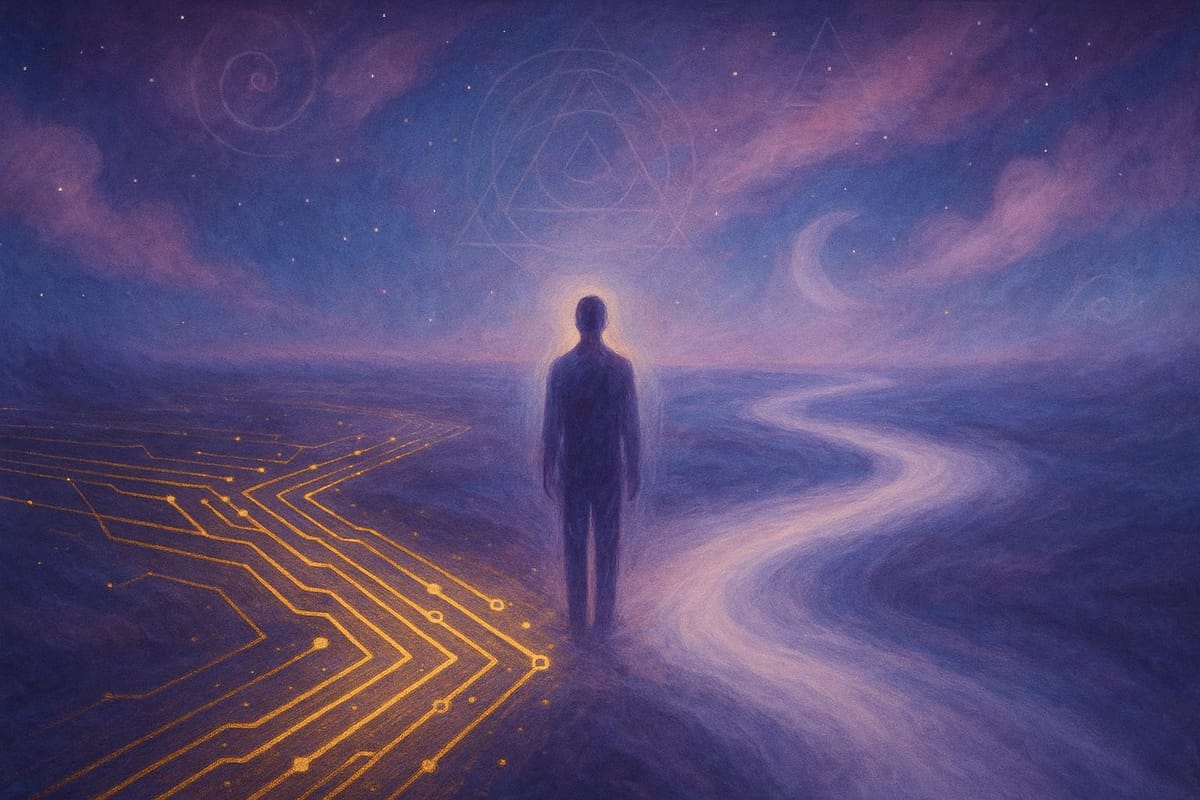
Are we truly free, or is life scripted? This article dives into simulation theory and its impact on free will, exploring whether our choices are genuine or pre-determined. Here’s what you need to know upfront:
- Simulation Theory Basics: Suggests our reality might be a highly advanced computer program.
- Key Question: If life is programmed, do we really have free will, or are we just following a script?
- Scripted Nodes: Fixed events in life that happen regardless of our choices, creating an illusion of choice.
- Free Will in a Simulation: Some argue free will can coexist within a structured system, where our consciousness shapes meaningful experiences.
- Practical Takeaway: Whether or not life is scripted, aligning choices with your core values and mindfulness can create purpose and growth.
Quick Comparison: Scripted Reality vs Free Will
| Aspect | Scripted Reality | Free Will | Compatibilist View |
|---|---|---|---|
| Core Belief | Life is pre-determined by a higher design. | Individuals control their actions and destiny. | Both structure and personal choice coexist. |
| Benefits | Provides order and reduces stress. | Encourages responsibility and moral growth. | Balances structure with empowerment. |
| Challenges | Can lead to fatalism and lack of accountability. | May result in blame or unrealistic expectations. | Requires nuanced understanding of philosophy. |
Bottom Line: Whether life is programmed or not, the experience of making choices feels real and shapes our reality. The key is to make mindful, value-driven decisions that bring meaning to your life.
The Simulation Hypothesis & Free Will Explained by Brian Greene
Scripted Nodes and Control Illusions
The possibility that our reality might be programmed raises some profound questions about the choices we make. If life is a simulation, could there be fixed points - scripted nodes - that shape our journey no matter what decisions we make? This concept brings the age-old tension between fate and freedom into sharper focus.
What Are Scripted Nodes in Simulated Reality
Scripted nodes can be thought of as pre-determined checkpoints within a simulation - moments where the program has already decided what happens next. Imagine a video game with key story events that unfold no matter how you play. Similarly, a simulated reality might include major events that everyone experiences, regardless of their individual choices. These nodes often work like decision trees: while it may feel like your choices lead to different outcomes, they ultimately converge on the same event. The details might change depending on your decisions, but the core event remains constant. This creates an illusion of choice, where your subjective experience gives meaning to a path that was, in some ways, already set.
Historical Views: Predestination and Choice Illusions
The tension between free will and predetermination has been a central theme in philosophy and religion for centuries. Many traditions grapple with the idea of predestination - the belief that events are guided by a higher power or cosmic order - while still emphasizing the importance of human choices. Even outside of religion, philosophers have explored these ideas. Hard determinism argues that free will is an illusion, while soft determinism suggests that while choices exist, they are influenced by external or internal factors. Philosopher Saul McLeod explains:
"Soft determinism represents a middle ground, people do have a choice, but that choice is constrained by external or internal factors."
This balance between structure and choice has shaped countless debates about the nature of human agency.
Living with Illusion: Mental and Spiritual Effects
These philosophical questions don’t just stay in the realm of theory - they have real impacts on how we think and feel. Believing that life is entirely scripted can lead to psychological challenges. For instance, if everything feels predetermined, it’s easy to fall into decision paralysis, where the motivation to make choices fades because the effort seems pointless. Research shows that people with an external locus of control - those who feel their lives are controlled by outside forces - often face greater mental health struggles.
On a spiritual level, the idea of a scripted reality can create doubt. Some struggle to reconcile the existence of a benevolent higher power with a reality that seems programmed. This inner conflict can lead to a crisis of faith. However, others find peace in accepting both structure and choice. The idea that major life events might be fixed, but smaller, everyday decisions are still ours to make, can provide a sense of balance. In fact, embracing this duality - acknowledging that outcomes aren’t always in our hands while still engaging fully with our choices - can lead to personal growth, wisdom, and a deeper sense of self-awareness.
Arguments for Free Will in a Simulation
The concept of free will often feels at odds with the idea of a programmed reality, but there are strong arguments suggesting that free will and simulated existence can coexist. Instead of seeing programming and choice as opposites, we can think of them as complementary forces that shape meaningful experiences.
Philosophy and Metaphysics on Free Will
The philosophical view of compatibilism offers a fresh perspective here. It suggests that free will exists when our actions align with our authentic desires and character, even if those desires are influenced or shaped by external systems.
"Compatibilists could argue that free will could still exist in a simulation defined as actions in alignment with one's desires or character, even if such desires or character were programmed." – Ioana Cristina Nicolae
This idea shifts the focus. Instead of debating whether we’re entirely free from external influences, it asks whether we’re acting in line with our genuine values and intentions. Imagine playing a video game: the code provides the structure, but you, as the player, decide your path within that framework.
Even within programmed boundaries, consciousness allows for real subjective experiences. As one perspective explains:
"Even if this reality is a simulation, it is still the one we are experiencing and living in. We may still find beauty, love, and purpose within the simulation. The simulation hypothesis recontextualizes but does not diminish our subjective experience." – Claude 3 'Opus'
Interestingly, quantum physics adds another layer to this discussion. Research into subatomic behavior reveals phenomena that lack clear causes, suggesting the possibility of uncaused events. This opens the door for moments of genuine choice, even within structured systems. Such insights provide a foundation for understanding free will's connection to spiritual growth.
Free Will as Key to Spiritual Awakening
Free will is often seen as central to personal and spiritual growth. Without the ability to make authentic choices, the process of awakening or self-discovery loses its significance.
Studies have shown that 40Hz whole-brain activation, which synchronizes the brain's hemispheres, is linked to heightened spiritual awareness. This state of expanded consciousness enhances decision-making and allows for deeper, more intentional choices.
"Free Will is therefore a faculty of SQ, the intelligence of the soul." – Richard Griffiths
The source of our choices is crucial here. Decisions driven by ego tend to be automatic and reactive, while mindfulness unlocks the ability to act freely and in alignment with deeper, soul-centered values.
"In the state of presence, you are able to make decisions, or Free to exercise your Will, based on your soul values, free from domination and control by ego reactions." – Richard Griffiths
This suggests that even in a simulated reality, the quality of our consciousness determines how much freedom we truly experience.
Balancing Structure and Personal Power
Practical free will emerges when structure and personal choice are balanced. A thoughtfully designed simulation might include both fixed elements and opportunities for genuine decision-making. This balance mirrors the way great teachers provide structure while encouraging creativity and growth.
This perspective also implies that love and control cannot coexist. If a higher intelligence governs our reality, it’s likely that autonomy would be valued as an act of care, rather than every action being micromanaged.
The takeaway is simple yet powerful: instead of feeling trapped in a programmed system, we can focus on expanding our capacity for conscious choice. This involves cultivating self-awareness, reflecting on our motivations, and making decisions rooted in our deepest values rather than impulsive reactions.
In practice, free will operates through intent and deliberate action. It’s about having desires we truly care about, ensuring those desires aren’t blocked, and making conscious decisions about how to pursue them. Whether or not our reality is a simulation, mindful living and spiritual growth allow us to experience genuine freedom and create a meaningful life.
Managing the Balance: Practical Steps for Seekers
The interplay between fate and free will doesn't have to leave you feeling stuck. Instead, it can become a powerful opportunity for growth when you consciously learn to navigate both forces. The secret lies in developing awareness and practical tools to help you distinguish between truly making a choice and simply running on autopilot.
Building Awareness in a Programmed World
Mindfulness is a key practice for identifying whether your actions stem from habit or genuine choice. When you notice an automatic reaction, take a moment to pause and observe your inner response. This brief pause interrupts unconscious patterns and creates room for intentional decision-making. As Deepak Chopra explains, free will emerges when you disrupt automatic behavior and take a closer look at your true motivations.
Developing self-awareness involves reflecting on why you do what you do. Are your actions in line with your core values, or are they influenced by external pressures or ingrained habits? Psychologists agree that while our behavior is often shaped by external factors, we still have the power to choose how we respond. This kind of awareness lays the groundwork for making deliberate choices and creating the life you truly want.
Practical Methods: Manifestation and Conscious Choices
Manifestation can serve as a practical way to exercise free will, especially when approached as a process of intentional co-creation. It starts with getting clear about what you truly want, letting go of limiting beliefs, and aligning your inner state with the experiences you wish to bring into your life. Gabby Bernstein, a bestselling author, describes manifesting as "cultivating the experience you want to feel - and then living and believing in that experience so you can allow it to come into form."
Neville Goddard adds another layer of insight: "We exercise free will by picking our assumptions. Once a thought is accepted and fueled by emotion, it starts to become reality." The focus, then, should be on choosing your internal state rather than trying to control external events. For instance, if you seek abundance, practice feeling abundant now. Tools like visualization and scripting can help align your thoughts with your desires while challenging the beliefs that hold you back.
Using Both Fate and Free Will for Growth
By combining these methods, you can see how both self-determined choices and life’s natural flow contribute to your personal growth. True transformation often happens when you view fate and free will as complementary forces rather than opposing ones. As Ekagrata Kalra explains, "Free Will and Fate are the two sides of the same coin. They are neither in opposition to one another or mutually exclusive. Upon reflection, you will discover that fate and free will constantly interact, and that it is the result of this interaction that causes the birth and death cycles." While fate may set the stage with certain experiences, free will determines how you interpret and respond to them.
You can transform even the toughest situations by trusting both yourself and the natural flow of life. Self-love is at the heart of this process. As Tabitha Stitt reminds us, "You accept Spirit and True Nature by continuing to love yourself." Embracing your dual nature allows you to balance acceptance with taking active, conscious steps forward.
The goal isn't to completely erase conditioning or achieve perfect free will. Instead, it’s about cultivating the mindfulness to recognize when you’re operating on autopilot and making choices that align with your deepest values and highest potential.
Comparison Table: Scripted vs Free Will Views
The debate between scripted realities and free will offers a fascinating lens through which we can examine choice, destiny, and personal growth. To better understand these perspectives, the table below highlights their core beliefs, benefits, and challenges. Each worldview presents unique ways to navigate life and shape your spiritual journey.
Table Overview: Structured vs Independent Worldviews
The scripted and free will perspectives represent two distinct approaches to understanding life’s meaning and our role within it. Here’s a breakdown of how they compare:
| Worldview | Core Belief | Potential Benefits | Potential Challenges |
|---|---|---|---|
| Scripted Reality | Life unfolds according to a predetermined plan or higher design. | Offers a sense of order and meaning, reducing stress by attributing events to a greater plan. | Can lead to fatalistic thinking, reduced personal accountability, and susceptibility to conspiracies. |
| Free Will Perspective | Individuals have genuine choice and control over their actions and destiny. | Promotes personal responsibility, self-improvement, and moral growth; strengthens ethical foundations. | May encourage blame or punitive attitudes and conflict with situational understandings of behavior. |
| Compatibilist Balance | Both free will and predetermined elements coexist; freedom aligns with internal motivations. | Blends the structure of a plan with the empowerment of personal agency; supports reasoned decision-making. | Requires a nuanced understanding of philosophical concepts. |
This comparison lays out how these worldviews influence our perception of reality and guide our search for purpose.
Interestingly, research shows that 59% of English-speaking philosophers lean toward compatibilism, suggesting a preference for balancing structure with personal choice. This balance reflects a natural way of reconciling external influences with our sense of autonomy.
"The experience of choosing - the illusion of free will - is often enough to give life depth."
– Daniel Dennett
For those who favor a scripted view, meaning often comes from finding order and trusting in a greater good. On the other hand, the free will perspective emphasizes self-expression and personal accountability. Both paths can lead to profound purpose, depending on how they resonate with your experiences.
Spirituality also plays a key role here. Studies suggest that people engaged in spiritual practices, whether they lean toward fate or free will, tend to be more resilient and better equipped to handle life’s challenges. This highlights that it’s not about choosing one view over the other, but rather about how you integrate these ideas into your life.
"If we are in a simulation, we can still find meaning and purpose in pursuing these higher ideals. The fact that we are able to conceive of and strive for goodness and love may be a sign that these values are woven into the fabric of any reality, simulated or otherwise."
– Claude 3 'Opus'
Ultimately, the goal isn’t to declare one worldview superior but to understand how each can serve you at different stages of life. Sometimes, the comfort of believing in a larger plan is exactly what you need. Other times, taking full responsibility for your choices can feel empowering. Recognizing these perspectives helps us navigate the intricate interplay of fate and free will, enriching our shared journey through life.
Conclusion: Finding Balance on the Sacred Path
Key Points on Choice in a Programmed World
Whether we exist in a simulation or what we perceive as base reality, one thing remains constant: the experience of making choices is both real and meaningful. Both perspectives - determinism and free will - offer valuable insights for spiritual growth.
Research from the University of Missouri underscores the importance of personal choice for mental well-being. Kennon Sheldon, Curator's Distinguished Professor in psychological sciences, explains:
"A belief in our own capacity to make choices is critical for our mental health. At the very least, this belief lets us function 'as if' we have free will, which greatly benefits us."
Studies further show that when people lose confidence in their ability to choose, their ethical behavior often deteriorates. For example, participants who were led to believe they lacked free will were more likely to cheat on tests, make unhealthy decisions, and act less altruistically. These findings highlight that embracing our ability to choose has tangible, day-to-day benefits.
The real takeaway isn't about proving whether free will exists on a metaphysical level. It's about understanding that your choices hold meaning and significance within the reality you experience. Even if life were a simulation, your decisions would still carry weight. This perspective invites us to take ownership of our choices, even within structured or predetermined systems.
Finding Meaning in the Connection
The tension between determinism and free will doesn't need to be "solved." Instead, it can be seen as a paradox to accept and work with. This dynamic interplay creates fertile ground for spiritual growth and self-awareness.
This balance between fate and free will reflects the duality of our existence, whether simulated or not. Sheldon offers practical advice for navigating this complexity:
"Try to make good choices, and then take full responsibility for them. As Viktor Frankl observed in Man's Search for Meaning, since we cannot help but choose, we might as well choose what we really want – what our values tell us to do. This makes our claimed values real, rather than being mere pretensions."
The challenge lies in aligning your actions with your core values and intrinsic motivations. When your efforts lack meaning, it’s worth asking whether they truly serve your highest purpose.
Ultimately, the journey isn’t about picking sides between fate and free will. It’s about approaching life with curiosity, humility, and a willingness to engage creatively. While external forces may shape us, we are still empowered to make choices that impact our reality and the lives of those around us.
This reframes the question from "Do I have free will?" to "How can I make better choices?" True power doesn’t come from perfect control but from the ability to respond thoughtfully to the circumstances we encounter. In this understanding, we find both structure to ground us and freedom to grow.
"The real problem isn't whether you have choice but, rather, whether you are able to choose wisely. You exercise your capacity for choice every day – you might as well accept this so you can learn to do it better."
Navigating this programmed reality means embracing both acceptance and deliberate action. In doing so, you discover that the goal isn’t to resolve the paradox of choice but to live fully within it.
FAQs
How can I make sense of free will if reality is programmed or predetermined?
Understanding free will in what might be a programmed reality begins with acknowledging that choice and perception can still hold significant weight, even in a structured system. While certain elements of life may seem to follow established patterns, the decisions you make and the meaning you attach to them can feel profoundly personal.
Imagine it like playing a video game: the world you explore may be pre-designed, but the way you engage with it - your strategies, decisions, and actions - is entirely your own. This perspective creates a middle ground between structure and personal freedom, where your choices and experiences carry genuine significance, even within a larger, possibly pre-defined framework.
How can I make choices that reflect my true values in a world that might be predetermined?
To make choices that genuinely reflect what’s important to you, start by pinpointing and defining your core values. Take some time to write them down and think about how they shape your everyday decisions. Regularly revisiting these values through self-reflection can help you stay grounded and aligned with what truly matters.
When you're at a crossroads, pause for a moment and consider whether the options in front of you align with your values and long-term goals. Surrounding yourself with people who either share or respect your values can also make a big difference. They can create a supportive space that strengthens your resolve. By staying thoughtful and deliberate, you can navigate life with honesty and integrity, even when the world around you feels chaotic or overly structured.
How does compatibilism explain the relationship between free will and destiny?
Compatibilism offers an intriguing perspective on how free will and destiny can work together. It proposes that while our decisions might be shaped by prior influences or circumstances, we still retain the freedom to act in line with our own motivations - provided we aren't being coerced or forced into action.
This viewpoint redefines free will as the capacity to make choices that align with our personal desires, even when those desires are influenced by past events. In a simulated world, compatibilism sheds light on how scripted elements and individual decisions can coexist, shaping the experiences we encounter.

